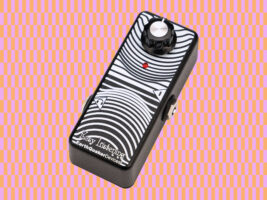
EarthQuaker Devices Easy Listening review – can an amp simulator this simple actually sound good?
$99/£115, earthquakerdevices.com
Maybe modern life really is just too complicated. Annoyed that your five favourite TV shows are on five different streaming services? Exasperated that there’s an app for everything even if it doesn’t need one? Bemused by the complex control arrays and secondary functions of digital amp simulators? The EarthQuaker Devices Easy Listening is here to help… well, with that last one anyway.
READ MORE: Walrus Audio Mako Series MkII ACS1 review: “this is as good as digital amp and cab simulators get”
Fully analogue and fuss-free, this one-knob wonder is designed to make it as easy as possible for you to enjoy playing the electric guitar – with or without effects pedals – in silence. And considering it’s made in the USA, it’s as cheap as it is straightforward.
EarthQuaker Devices Easy Listening – what is it?
Is a pedal even a pedal if it doesn’t have a footswitch? That’s the level of simplicity we’re dealing with here: power it up, plug a guitar in on the right and some headphones on the left, then turn it up to one notch shy of permanent hearing damage – congratulations, you have now explored the full functionality of the Easy Listening.
Tonally it’s based on the legendary Fender Deluxe Reverb, so that should mean plenty of top-end chime and a sweetly scooped midrange. Will it also mean a lovely bit of crunch when you crank it? Nope, because there’s no crank to crank: that single control is for output level, not input gain, and we’re promised lots of headroom to ensure it’ll stay clean and take pedals without getting squishy.
The output is a proper quarter-inch type, and this can also be fed to an audio interface for direct recording. It’s TRS so you could even send it to two channels, though as this is a mono device that’s not exactly a major selling point.
Image: Press
EarthQuaker Devices Easy Listening – what does it sound like?
In a sense, the words ‘pure’ and ‘basic’ mean the same thing… but with very different connotations. So yes, the fixed tone of the Easy Listening is pure – it’s clean and bright in classic black-panel Fender style, with a nicely rounded bottom end – but it’s undeniably a little bit basic too.
Maybe a better word is ‘unrefined’: natural compression is a key feature of small amps like the Deluxe Reverb, but here the dynamics are left wide open – which might be why you still get a hint of the dreaded plasticky DI ‘slap’ when you attack a note or chord. This is most noticeable with bridge humbuckers, which can sound alarmingly raw. The good news is, adding dirt pedals definitely helps – and all that headroom does indeed offer a giant playground for them to run around in. Overdrives that prefer some amp gain to work with might feel somewhat exposed here, but it’s a reliably blank canvas for everything else.
As for recording… well, I wouldn’t use it for anything important, but my test tracks ended up sounding quite respectable with a bit of software compression and reverb plus a slight EQ dip around the 2.5kHz mark. A decent result, then, but don’t throw away your favourite digital amp sim just yet – sometimes it’s good to be complicated.
EarthQuaker Devices Easy Listening – should I buy it?
Be warned: there’s much more to a good amplifier than EQ filtering, so a simulator as stripped-back as this is never going to get you the whole amp experience. But the Easy Listening is pitched as a handy little practice gadget – albeit one with solid made-in-America pedigree – and that’s exactly what you’re getting.
EarthQuaker Devices Easy Listening alternatives
Most modern amp sims are very much digital affairs, but there is a powerful analogue contender in the DSM & Humboldt Simplifier MkII ($359/£349) – and an old-school survivor in the battery-powered Electro-Harmonix Headphone Amp ($52.60), which presumably only exists because they forgot to discontinue it.
The post EarthQuaker Devices Easy Listening review – can an amp simulator this simple actually sound good? appeared first on Guitar.com | All Things Guitar.
Source: www.guitar-bass.net













